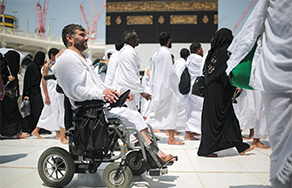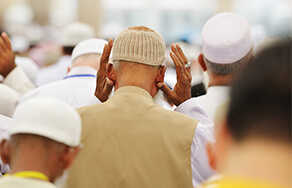AIf a person falls ill on the day of Arafah during Hajj and it makes him unable to complete the rituals, and he had made the condition by saying, “Fa In Habasani Habisun Famahalli Haithu Habastani (Should anything prevent me, then I may leave the state of Ihram at the point at which You stopped me),” then he may leave the state of Ihram and there is nothing incumbent upon him. But if the Hajj was an obligatory one then the person must perform it another year. In case he did not make this condition and he was unable to complete his Hajj then, he may leave the state of Ihram but must sacrifice an animal. Allah says,
وَأَتِمُّواْ الْحَجَّ وَالْعُمْرَةَ للَّهِ فَإِنْ أُحْصِرْتُمْ فَمَا اسْتَيْسَرَ مِنَ الْهَدْيِ
“And perform properly (i.e. all the ceremonies according to the ways of Prophet Muhammad (pbuh)), the Hajj and ‘Umrah (i.e. the pilgrimage to Makkah) for Allah. But if you are prevented (from completing them), sacrifice a Hady (animal, i.e. a sheep, a cow, or a camel) such as you can afford.” [Al-Baqarah 2:196]
So the person should leave the state of Ihram and sacrifice an animal, and there is nothing incumbent upon him. If he is performing the obligatory Hajj, then he must perform it again the following year.
However, if the sick person continues the journey in his Hajj and stays in Muzdalifah, but neither stays in Mina nor stones the Jamarat then, his Hajj is valid and it will be counted for him. But in this
case he must sacrifice an animal for each obligatory act that he did not perform. He must sacrifice two animals, one for not staying in Mina, and the other for not stoning the Jamarat.
As for Tawaf-ul-Ifadah, he should remain and perform the Tawaf if Allah cures him. The limit for performing Tawaf-ul-Ifadah is the end of the month of Dhul-Hijjah.
Note: It is recommended to consult and seek an opinion from scholars on doubtful Islamic matters.


